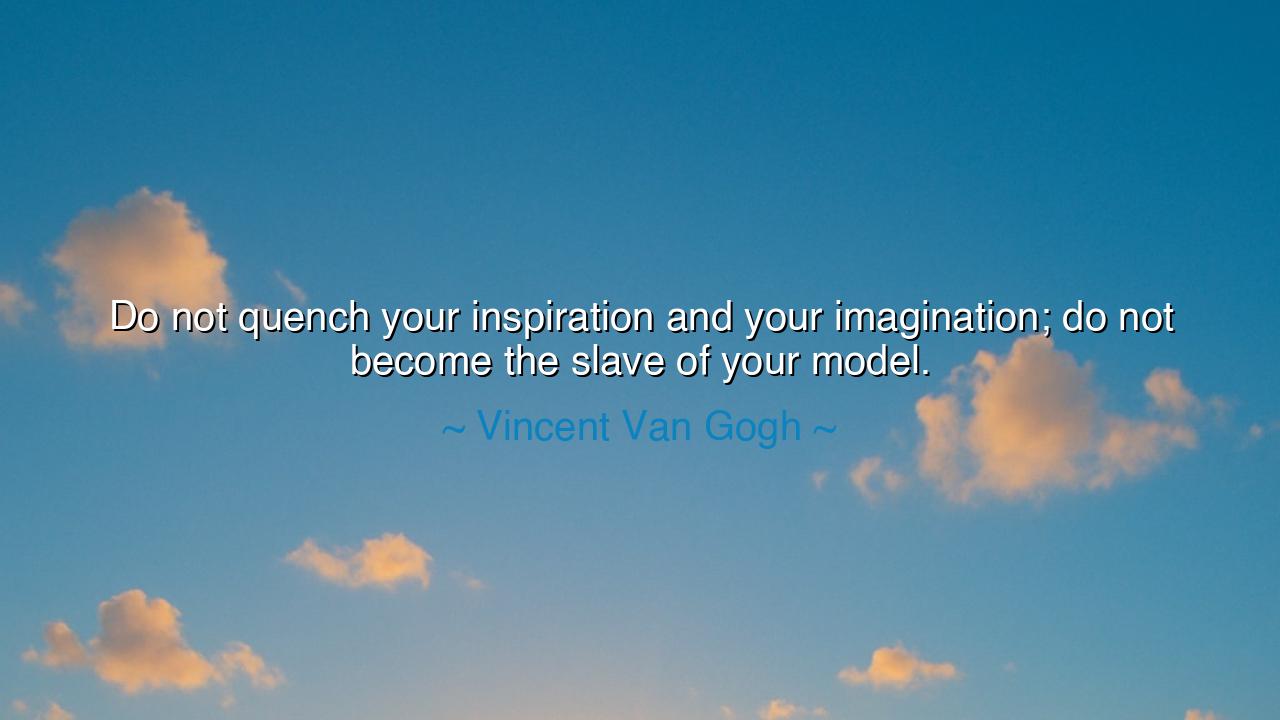
Do not quench your inspiration and your imagination; do not
Do not quench your inspiration and your imagination; do not become the slave of your model.






“Do not quench your inspiration and your imagination; do not become the slave of your model.” Thus spoke Vincent van Gogh, the fiery soul whose colors burned brighter than the world could bear. In this exhortation, he calls out to all who create, all who dream, all who dare to see the world anew. He warns against the death of the spirit, the slow suffocation that comes when inspiration is stifled by imitation, when imagination bows before convention. Van Gogh speaks not only to painters but to all living beings who were born to shape, to build, to envision—to live creatively. His words are a cry of defiance: do not surrender your inner fire to the cold dictates of form.
The origin of this quote lies deep within the turbulence of Van Gogh’s own life, written in his letters to his brother Theo, where he poured out the struggle between his artistic vision and the rigid standards of society. He was a man who painted not what he saw, but what he felt—the trembling of life beneath the surface of things. To many, his works were madness: swirling skies, burning fields, faces alive with color and emotion. But to Van Gogh, this was truth—a truth that came not from copying the external world but from expressing the imagination’s inner light. His plea, therefore, is not merely artistic advice; it is a moral commandment to remain free, to be faithful to one’s own vision, even when misunderstood or condemned.
When Van Gogh says, “Do not quench your inspiration,” he speaks against the slow erosion of wonder. Inspiration is the divine breath that animates creation, the sacred flame that lights the human spirit. It cannot be forced; it must be nurtured, cherished, protected from the damp winds of fear and conformity. The artist who paints only what he sees, without the fire of imagination, becomes a mirror, not a creator. Likewise, the human being who lives only by imitation, who follows every rule without question, becomes a shadow, not a soul. To quench inspiration is to extinguish the very purpose of existence—to forget that each life is a work of art unfolding.
The second half of Van Gogh’s warning—“do not become the slave of your model”—reveals the deeper wisdom of his heart. The model here is not only the figure before the painter’s eye, but every external authority that tries to dictate the shape of one’s creation: teachers, traditions, expectations, even fear itself. The model can be a literal object, but it can also be the invisible cage of perfectionism or the pressure to please others. To be enslaved by it is to lose one’s originality, to mistake imitation for mastery. Van Gogh urges us instead to transform what we see through the lens of our imagination—to make reality our servant, not our master.
History offers a luminous example of this truth in the life of Leonardo da Vinci. Though he studied anatomy, geometry, and nature with unmatched precision, he did not allow himself to become enslaved by his observations. He fused science and imagination, blending the real and the impossible into visionary works. His sketches of flying machines, his celestial landscapes, his Mona Lisa—all were born not from copying the world but from reimagining it. Like Van Gogh centuries later, Leonardo understood that the artist’s duty is not to reflect creation, but to expand it. To follow the model is to see only what already is; to follow imagination is to glimpse what might yet be.
O seeker of truth, understand this teaching: there is a tyranny in imitation. The world will always tell you to be realistic, to follow the model, to fit within the frame. But the soul is not meant for containment—it is meant for creation. If you would live fully, you must resist the temptation to measure your worth against the standards of others. Do not quench your inspiration when the world calls it foolish. Do not bow your imagination to the narrow gods of perfection. Instead, let your inner vision lead you beyond what is known, for that is where all greatness begins.
Therefore, let this be your lesson: be faithful to your inspiration, no matter how strange its voice may sound. Guard your imagination as a sacred gift, for it is the power that transforms dust into dreams and chaos into beauty. Learn from the masters, yes—but do not become their echo. Use the model as a starting point, not a prison. Live as Van Gogh painted: boldly, honestly, passionately—so that even if the world misunderstands you, the heavens themselves will know that you burned brightly, that you kept the sacred flame alive. For it is better to be misunderstood in the light of inspiration than to be praised in the shadows of imitation.






AAdministratorAdministrator
Welcome, honored guests. Please leave a comment, we will respond soon